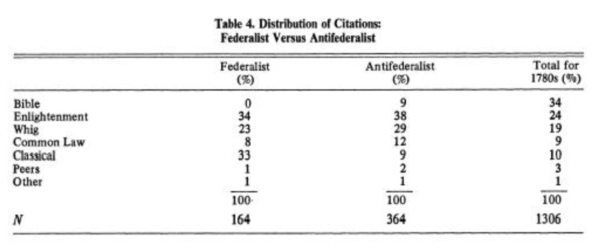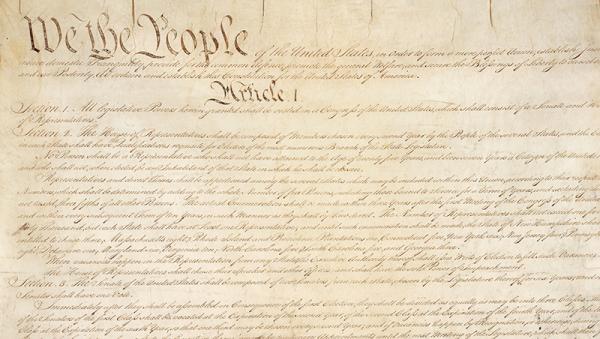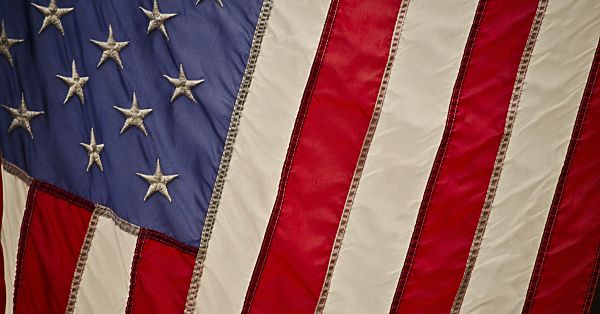John Yoo is a professor of law at University of California at Berkeley. Remind me never to recommend anyone go there. In a recent Fox News appearance, he tells Laura Ingraham that the framers of the Constitution would never have wanted a president to be impeached in an election year. Watch:
I am puzzled by this line of thinking. I don’t understand his basis for believing it. When I heard it, my mind went back to the discussion of impeachment during the Constitutional Convention. The delegates debated this exact point and rejected the thrust of Yoo’s argument. Yoo is partly correct in that some framers didn’t want impeachment at all because they believed the election process was sufficient to discourage a corrupt or bad president. However, other framers (including Madison and George Mason) argued that elections were not enough and impeachment was necessary to allow the removal of a corrupt and compromised executive.
Here is some of the discussion on this very point from the Constitutional Convention on the date July 20, 1787.
On the clause, “to be removable on impeachment and conviction for malpractice or neglect of duty,” (see the ninth Resolution), —
Mr. PINCKNEY and Mr. GOUVERNEUR MORRIS moved to strike out this part of the Resolution. Mr. PINCKNEY observed, he ought not to be impeachable whilst in office.
Mr. DAVIE. If he be not impeachable whilst in office, he will spare no efforts or means whatever, to get himself re-elected. He considered this as an essential security for the good behaviour of the Executive.
Lawyers Charles Pinckney from South Carolina and Gouveneur Morris from Pennsylvania moved to strike the impeachment clause from the Constitution. Discussion followed on the motion. North Carolinian William Davie specifically rejected the notion that periodic elections were sufficient to secure good behavior in a president.
Mr. WILSON concurred in the necessity of making the Executive impeachable whilst in office.
Mr. GOUVERNEUR MORRIS. He can do no criminal act without coadjutors, who may be punished. In case he should be re-elected, that will be a sufficient proof of his innocence. Besides, who is to impeach? Is the impeachment to suspend his functions? If it is not, the mischief will go on. If it is, the impeachment will be nearly equivalent to a displacement, and will render the Executive dependent on those who are to impeach.
Initially, Morris did not favor impeachment but as the discussion wore on, he changed his mind. Relevant to Yoo’s claim, the framers did debate the notion that elections had something to do with impeachment but impeachment as the sole power of the House eventually won out.
Colonel MASON. No point is of more importance than that the right of impeachment should be continued. Shall any man be above justice? Above all, shall that man be above it who can commit the most extensive injustice? When great crimes were committed, he was for punishing the principal as well as the coadjutors. There had been much debate and difficulty as to the mode of choosing the Executive. He approved of that which had been adopted at first, namely, of referring the appointment to the National Legislature. One objection against Electors was the danger of their being corrupted by the candidates, and this furnished a peculiar reason in favor of impeachments whilst in office. Shall the man who has practised corruption, and by that means procured his appointment in the first instance, be suffered to escape punishment by repeating his guilt?
George Mason asked two questions that every Republican should ask today: “Shall any man be above justice? Above all, shall that man be above it who can commit the most extensive injustice?”
The Justice Department seems to have placed Donald Trump above the law. However, is it right that the man who can commit the “most extensive injustice” be above the law? As we see in this debate, the framers voted to include impeachment as the answer. No one is above the law.
Doctor FRANKLIN was for retaining the clause as favorable to the Executive. History furnishes one example only of a First Magistrate being formally brought to public justice. Every body cried out against this as unconstitutional. What was the practice before this, in cases where the Chief Magistrate rendered himself obnoxious? Why, recourse was had to assassination, in which he was not only deprived of his life, but of the opportunity of vindicating his character. It would be the best way, therefore, to provide in the Constitution for the regular punishment of the Executive, where his misconduct should deserve it, and for his honorable acquittal, where he should be unjustly accused.
Mr. GOUVERNEUR MORRIS admits corruption, and some few other offences, to be such as ought to be impeachable; but thought the cases ought to be enumerated and defined.
Mr. MADISON thought it indispensable that some provision should be made for defending the community against the incapacity, negligence, or perfidy of the Chief Magistrate. The limitation of the period of his service was not a sufficient security. He might lose his capacity after his appointment. He might pervert his administration into a scheme of peculation or oppression. He might betray his trust to foreign powers. The case of the Executive magistracy was very distinguishable from that of the Legislature, or any other public body, holding offices of limited duration. It could not be presumed that all, or even the majority, of the members of an Assembly would either lose their capacity for discharging, or be bribed to betray, their trust. Besides, the restraints of their personal integrity and honor, the difficulty of acting in concert for purposes of corruption was a security to the public. And if one or a few members only should be seduced, the soundness of the remaining members would maintain the integrity and fidelity of the body. In the case of the Executive magistracy, which was to be administered by a single man, loss of capacity or corruption was more within the compass of probable events, and either of them might be fatal to the Republic.
Madison told his fellow delegates that the “limitation of the period of his service was not a sufficient security.” In other words, the fact that the president has to face the voters isn’t a sufficient security against a president who deserves impeachment.
Later in the debate, Gouverneur Morris changed his position:
Mr. GOUVERNEUR MORRIS’S opinion had been changed by the arguments used in the discussion. He was now sensible of the necessity of impeachments, if the Executive was to continue for any length of time in office. Our Executive was not like a magistrate having a life interest, much less like one having an hereditary interest, in his office. He may be bribed by a greater interest to betray his trust; and no one would say that we ought to expose ourselves to the danger of seeing the First Magistrate in foreign pay, without being able to guard against it by displacing him.
Note that the framers were quite worried about foreign entanglements on the part of the president. If we are concerned about what the framers intended, then we should include that in our calculation. Much of the impeachment saga involves Donald Trump’s foreign entanglements and the efforts of the House of Representatives to find out the facts about them. Every step has been met with resistance and obstruction from Trump.
The delegates voted and the motion for impeachment carried:
On the question, Shall the Executive be removable on impeachments, &c.? — Connecticut, New Jersey, Pennsylvania, Delaware, Maryland, Virginia, North Carolina, Georgia, aye — 8; Massachusetts, South Carolina, no — 2.
Impeachment for Maladministration?
The Convention took up impeachment again on September 8, 1787 with the grounds for impeachment and removal being the focus of debate.
The clause referring to the Senate the trial of impeachments against the President, for treason and bribery, was taken up.
Colonel MASON. Why is the provision restrained to treason and bribery only? Treason, as defined in the Constitution, will not reach many great and dangerous offences. Hastings is not guilty of treason. Attempts to subvert the Constitution may not be treason, as above defined. As bills of attainder, which have saved the British constitution, are forbidden, it is the more necessary to extend the power of impeachments. He moved to add, after “bribery,” “or maladministration.”
Mr. GERRY seconded him.
Mr. MADISON So vague a term will be equivalent to a tenure during pleasure of the Senate.
Mr. GOUVERNEUR MORRIS. It will not be put in force, and can do no harm. An election of every four years, will prevent maladministration.
Colonel MASON withdrew “maladministration”; and substituted, “other high crimes and misdemeanors against the State.”
On the question, thus altered, —
New Hampshire, Massachusetts, Connecticut, Maryland, Virginia, North Carolina, South Carolina1 , Georgia, aye, — 8; New Jersey, Pennsylvania, Delaware, no, — 3.
Perhaps professor Yoo is influenced by this debate. By this time, Gouverneur Morris favored impeachment but still felt that the periodic election would be a deterrent to a president accused of maladministration. However, the central action taken here by the delegates was to add “high crimes and misdemeanors against the United States” to the reasons for impeachment. No limitation was added on when the House and Senate could act on their Constitutional duties.
One founder — Gouverneur Morris – might be advanced to say a framer wouldn’t favor an impeachment inquiry for maladministration since he believed elections should decide those matters. However, Yoo makes a significant error to appeal to the framers as a group when the only authority is the Constitution. Also, the debates and votes of the delegates demonstrate that the consensus was to hold the president accountable via impeachment by the House and trial by the Senate.
 By the way, the Smithsonian has 156 million items, 145 million of which are scientific artifacts.
By the way, the Smithsonian has 156 million items, 145 million of which are scientific artifacts.

